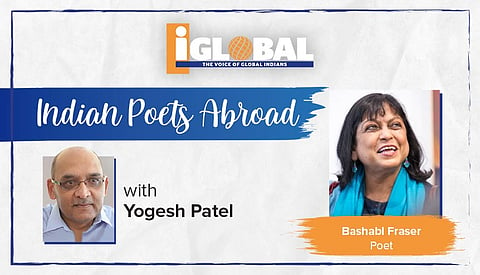

Writer-poet Yogesh Patel MBE returns with his Indian Poets Abroad series, in which he highlights the life and work of acclaimed poets of Indian heritage living abroad and writing in English.
Writers are regularly reminded that they should write about what they know. However, that will apply to a degree because writers’ palette gets expansive and demands that they step into different shoes! That aside, poets often fare well when they draw from their experience. Bashabi Fraser proudly holds her pen with such awareness.
Dr Bashabi Fraser CBE is Professor Emerita of English and Creative Writing and Director of the Scottish Centre of Tagore Studies (ScoTs), Edinburgh Napier University, a Royal Literary Fund Fellow, an Honorary Fellow at Edinburgh University and Chief Editor of ‘Gitanjali and Beyond’. Critics have hailed Dr Fraser’s poetry and experience as a swirl of emotions and images.
Q: Congratulations on receiving the CBE this January. You are prolific as a poet, writer, academic and educationist; what has Bashabi still left to achieve?
A: The CBE was awarded for my contribution to education (academic work and publications), culture (poetry), and integration (building bridges between Scotland and India). I am humbled and truly grateful for this national recognition and feel quite overwhelmed by it.
My first love is poetry, so I hope my poetry resonates with readers in years to come. I still have a lot to write about. However, I am deeply indebted to Rabindranath Tagore’s philosophy and work. I would like a global audience to read my critical biography, ‘Rabindranath Tagore’, and other writing endorsing the continuing relevance of Tagore.
Tagore took on a one-man mission in his post-Nobel years through his lectures and meetings to bring the East and West closer by promoting mutual respect and understanding. I would like the Scottish Centre of Tagore Studies (ScoTs) I co-founded and am Director of — along with our international e-journal ‘Gitanjali and Beyond’ — to continue Tagore’s bridge-building work.
Q: You have made a hallmark of your duality in the titles of your poetry collections: ‘Ragas & Reels’, ‘Tartan & Turban’, ‘From the Ganga to the Tay’, and ‘The Homing Bird’. They are a celebration of the duality all the way. How do all these books differ, why, and what angles will readers discover in them?
A: Thank you for noting the significance of the books’ titles. ‘Tartan & Turban’ embodies my experience of living between two worlds, India and Britain, sometimes with a sense of disorientation as I wonder where I am – in which country.
‘Ragas & Reels’ draws inspiration from the photo-stories by renowned photographer Hermann Rodrigues, capturing the South Asian diaspora in Scotland. It documents the journeys individuals have made – physical, metaphorical, cultural and professional. Some poems are about place names, which have travelled from India to Scotland, encapsulating the migrant experience.
‘From the Ganga to the Tay’ is a poetic conversation between the two rivers who reminisce about shared history, reflecting on their geographical journey, economic connections, mythology and romance. This is a concrete poem, which mirrors a meandering river on the page, and in the bends of the text-rivers sits metaphorical images by the artist, Kenny Munro. The rivers signify a sustainable environment, civilisation, peace, life’s continuity, global journeys and migration.
In the title poem of ‘The Homing Bird’, there are two sections entitled: (i) ‘Kolkata’ with the refrains: ‘Kolkata, do you remember me?’ and ‘Kolkata do you miss me?’ and (ii) ‘Edinburgh’ where I ask, ‘Edinburgh, do you accept me?’ These questions encapsulate the mood of the collection about departures and arrivals, the here and there, as the past permeates the present.
Q: In my blurb for your pamphlet, I wrote: ‘These poems are a colourful sari blanketing Scotland with inner conflicts of a migrant Indian’. How much feminism of this sari flutters in your books? As you are proposing Tagore as concurrent to our time; how does your extensive work in promoting his studies fit your feminism, duality and poetics?
A: This is a difficult but pertinent question. I really appreciate your metaphor of the sari, describing my work. In fact, my poem ‘My Mum’s Sari’, is now a BBC Bitesize publication with ‘Word Waves’, included in the UK primary school curriculum.
I have choreographed and directed Tagore’s dance-dramas like ‘Chitrangada’, ‘Shyama’ and ‘Chandalika’ for a Scottish audience, in which the chief protagonists are women, who highlight themes of female leadership, crime, punishment, and forgiveness, adding to it the tragedy of social exclusion. My writing dwells on these themes in poetry, academic publications and lectures. I reflect on Tagore’s depiction of a woman stepping over the threshold from her home into the world and taking her rightful place in it.
My ‘duality’ involves maintaining a balance between my pride in my Indian heritage while being loyal to my British/Scottish association. This is easy as India courses through my blood and Britain is where I have gained recognition as a poet and academic. Moreover, my daughter embodies this dual heritage through her love of Kathak, Flamenco and classical ballet. The chosen poem should speak on it. And now I speak to my little grandson in Bengali. He is happily trilingual (English, Bengali and German – the last, learnt from his father).
This is the internationalism Tagore would have appreciated, carried through the generations like a life-giving river.
Yogesh Patel MBE runs Skylark Publications UK as well as the non-profit Word Masala project to promote South Asian diaspora literature. He is the recipient of many awards, including as Poet of Honour at New York University in April 2019. Practised by many poets in English literature internationally, he has invented a new poetic form entitled Rapid. By profession, he is a qualified optometrist and an accountant.
In this regular series for ‘iGlobal’, he profiles Global Indian poets from around the world.